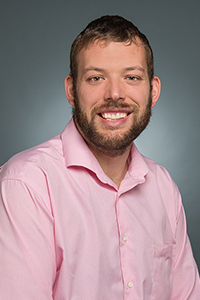News — In the final stretch of the 2024 U.S. Presidential Election, two CSUDH political science professors answer questions about what this historic moment means for voters, public discourse, and the health of our democracy.
CSUDH is a non-partisan educational institution that does not endorse any political candidate or ballot initiative.

Assistant Professor of Political Science Julien Labarre
Labarre focuses on the health of the information environment, and how the media and political psychology contribute to pathologies of democracy like polarization, populism, and extremism.
What do you find notable about this election?
For the first time since 9/11, we see a party—the Democrats—trying to depolarize public discourse. Since the late nineties, the two parties have become more and more divided, both in terms of policy and in terms of emotion. Parties have become increasingly hostile toward one another, but this is the first election in a long time where I’ve seen a good-faith effort from a party to reach across the aisle. Since 2020, Kamala Harris has repositioned herself as a prosecutor, rather than a progressive, and she recently stated she’d offer cabinet positions to Republicans.
This election is also particularly notable for how much fake and AI-generated content is circulating. You could say, well, much of this is so blatantly false. Nobody’s going to believe that, so what difference does it make? I think it makes a huge difference.
Why does that type of disinformation matter?
People focus a lot on what we think is compelling disinformation because we worry that people are going to believe it. But I think cheap disinformation has the potential to be much more dangerous. It primes people to doubt what’s true and think they are surrounded by lies. I think this is a strategy by the Trump campaign to lay the groundwork for contesting the election results.
Also, polarization drives disinformation. When there is a lot of partisan hostility in a given country, that makes people more selective in terms of what information to trust. It’s a problem. You start questioning even basic facts as being potentially partisan. Our partisan media feeds into this and makes people even more distrustful.
What can individuals do to resist polarization and partisanship?
After the 2016 election, there was a lot of political unfriending on social media between Trump and Clinton voters. Curating relations like that can be quite toxic to democracy. We need to talk to each other, stop being condescending towards people with different viewpoints, and not fall into an “us versus them” dynamic.
People also need to realize that almost everything around us is mediated communication. Our media has founded a profitable business model based on telling people what they want to hear, sometimes at the cost of information quality. Make a conscious effort regarding your media diet.

Associate Professor of Political Science Christopher Hallenbrook
Hallenbrook studies conceptions of political obligation in the Anglo-American world and how political theory informs modern public policy debates.
What reassurances can people take if they are disappointed with the election results?
We’ve had a lot of crises as a country, going all the way back to our second and third presidents accusing the other of being an existential threat to democracy. This kind of rhetoric has gone on for more than two centuries, and yet our democracy has survived.
Also, neither candidate will be able to enact their full agenda. The president can do a lot through executive power, but we may have divided government depending on which party controls Congress. In all likelihood, the elected president will be able to do a lot less than their supporters want.
Additionally, states have their own constitutional powers. As an example, when Roe vs. Wade was overturned, it became a state-level issue. While other states became highly restrictive, nothing changed in California. Although the supremacy clause means that federal law will always win out, there would need to be an act of Congress banning abortion in the U.S. to overrule California’s constitutional protections on abortion access. That’s extremely unlikely to happen, and it shows how states have a good deal of sovereignty.
Speaking of California, are there any state propositions or measures of interest this election?
First of all, everyone should vote down ballot! Statewide, countywide, and citywide measures are where you have the biggest impact. One vote for president in California doesn’t change much, but on those local measures, one vote makes a much bigger difference.
I find Prop. 6 really interesting because it eliminates California’s constitutional provision allowing involuntary servitude. The 13th amendment ended slavery in the U.S., but the specific wording is that slavery and involuntary servitude are prohibited except as punishment for crime. This means prisoners can be forced to work for very low wages, and we’ve seen that in California. This proposition would make it so people in prison can’t be punished for not working, and would increase wages for their labor.
There are a lot of propositions and measures to research. What are trusted resources voters can use to educate themselves?
I recommend the , which comes with your mail ballot, and . Our department also recently held a recent election education event, which can be viewed below.
Filed Under: , Tagged With: , , , , , , , ,
